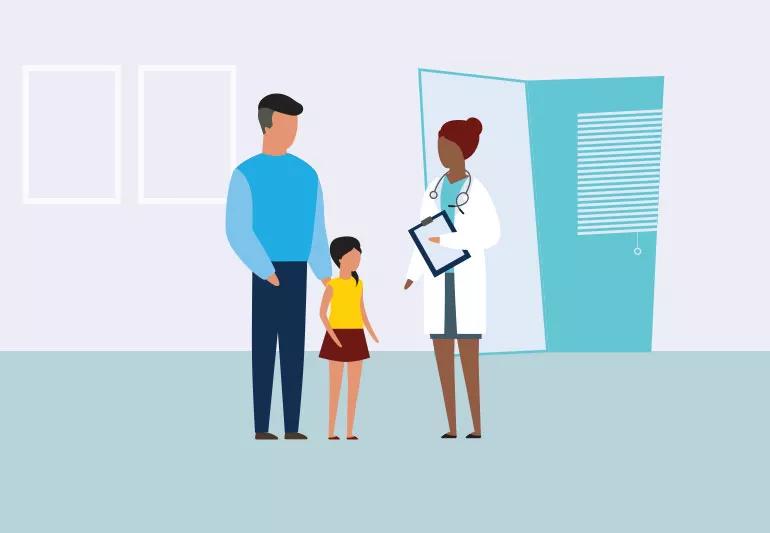Try foods first to see if your child has a reaction

Raising kids can sometimes feel like you’re in a constant state of low-level panic. What if they break an arm on the playground? Are they getting enough sleep? How much screen time is just too much?
Advertisement
Cleveland Clinic is a non-profit academic medical center. Advertising on our site helps support our mission. We do not endorse non-Cleveland Clinic products or services. Policy
And then there’s the fear of allergic reactions, specifically around what they eat. The Centers for Disease Control and Prevention (CDC) says that about 8% of children (1 in 13) have a food allergy.
“Can’t I just get my child tested for food allergies and take one worry off my plate (and out of my fridge)?”
Unfortunately, says pediatric allergy specialist Jackie Bjelac, MD, allergy tests don’t work that way.
“The allergy tests performed in a doctor’s office are imperfect,” Dr. Bjelac says. “The absolute best test for food allergies is your history of reaction after you were exposed. Allergy tests should be used to confirm an allergy, not discover it.”
Dr. Bjelac explains when and how doctors test kids for food allergies and what to do if you suspect your child has one.
There’s no right age to test your child for allergies. The best time to consider an allergy test is after your child has eaten a food and shows signs of a food allergy.
“If you are exposed to something and don’t have symptoms, you are not allergic. There is no test that would convince me otherwise,” Dr. Bjelac states. “The opposite is also true. If a child clearly reacts to a food, but their allergy test is negative, I don’t believe the test. Exposure history trumps everything.”
Advertisement
These eight foods account for about 90% of all food allergies:
Common symptoms of a food allergy in a child can include:
If your child is experiencing a severe allergic reaction, contact your healthcare provider immediately or get medical help right away. In rare cases, an allergic reaction can lead to anaphylaxis, a severe condition that requires quick medical attention.
Dr. Bjelac says if your child is having an allergic reaction to a food, the symptoms should be obvious.
“Allergic reactions to food are not subtle,” she continues. “If you’re thinking, ‘Well, maybe Junior isn’t sleeping well because of a food allergy.’ That’s not a thing. That can be really hard for parents, though, because sometimes, we go down rabbit holes when we’re looking out for what’s best for our kids. It’s normal to worry.”
Studies call a history of allergic reactions the “cornerstone of diagnosis of food allergy.”
But why is it that we have to subject children to possible allergens and then hope they don’t break out in hives?
Research shows that current allergy tests just aren’t up to the task of reliably diagnosing food allergies for people who don’t have a history of an allergic reaction to that food. Without a history, the tests are too difficult to interpret accurately.
And inaccurate results can have a detrimental impact on your child’s well-being.
“If an allergy test indicates that your child has a wheat allergy, or an egg allergy or any food allergy, suddenly your life changes to avoid allergen-containing foods, and kids can be picky eaters as it is,” Dr. Bjelac says. “So, if that test is wrong, you’re putting them on a restricted diet when they don’t need to be. You’re avoiding nutritionally dense food that is important for their growing body and mind.”
Further, labeling a child as having food allergies can come with significant effects on your child’s mental health and social life. Studies show that the fear and vigilance that comes with living with a food allergy can negatively affect a child’s quality of life.
Food is a common bonding experience among friends and family. Kids with food allergies may need to sit at a special table in the school lunchroom or miss out on cake and ice cream at a friend’s birthday party, which can be socially isolating.
“If we’re diagnosing someone with a food allergy, there are big implications for their life and their family’s lives,” Dr. Bjelac notes. “Families need to know that there is a dangerous situation if the child eats the food, not just assume there will be a problem.”
Advertisement
Allergy tests can be performed for kids who have a history of allergic reactions to:
When testing children for food allergies, Dr. Bjelac says your healthcare provider will likely use a skin test or blood test. Other kinds of allergy tests are better suited for other kinds of allergies. Patch tests, for example, are used to diagnose allergies that affect the skin, like nickel or certain ingredients in skin care products. Intradermal injections — which use a needle to inject a small amount of an allergen into the skin — are suitable for confirming allergies to medications or pollen, for example. Neither of those is used for testing food allergies.
In an allergy skin test, your healthcare provider will use a thin needle to prick the skin on your child’s forearm or back with several different potential allergens. Or your provider may place droplets of potential allergens onto their skin and use a device to scratch and lightly puncture the area. If an allergy is detected, your child’s skin will show redness, a rash or raised, round spots at the site of the allergen.
In an allergy blood test (IgE test), your provider will take a small vial of blood and test it against suspected allergens. The test measures levels of Immunoglobin E (IgE) antibodies, which are proteins your body sends out to get rid of germs. If you have an allergy, your body produces IgE in response to the allergen, even if it’s harmless. Allergy blood tests can deliver false positive results more than half of the time.
Advertisement
One of the most effective ways to test for allergies is by taking part in a food challenge test. The Food Allergy and Research organization, or FARE, calls it the “gold standard” for diagnosing allergies effectively.
In a food challenge, a child with a suspected or confirmed food allergy goes to a medical facility to be introduced to foods and monitored closely for a reaction by medical staff, who can provide treatment quickly in the case of a reaction. Food challenges are lengthy (usually several hours long) and usually are reserved for children at the highest risk for severe allergic reactions.
“Food challenge is a really powerful tool, especially when used in situations where we think it’s too risky to try at home,” Dr. Bjelac says.
Food challenges may also be considered in some cases where a child is suspected to have outgrown an allergy.
Food allergies can be dangerous and scary for kids and their families. Monitor your child after they eat a new food, particularly ones that are common allergens. If your child has an allergic reaction, or if you suspect an allergy, don’t hesitate to contact a healthcare provider.
“If your child had an allergic reaction, reach out to a board-certified allergist to talk about what testing is appropriate based on what those possible triggers could have been,” Dr. Bjelac says.
Advertisement
Learn more about our editorial process.
Advertisement

Bleeding is a risk and warrants taking care, but the reward of this lifesaving medication is great

Severe and debilitating headaches can affect the quality of your child’s life

With repeat injections over time, you may be able to slow the development of new wrinkles

Although it can be alarming, it’s normal to experience blood clots during menstruation

Stretch before heading outside, keep proper form and avoid jerking or twisting to throw snow

Type 2 diabetes isn’t inevitable with these dietary changes

Applying a hot or cold compress can help with pain